Qualitative Research Methodology: Empirical Phenomenological Analysis
VerifiedAdded on 2023/06/08
|11
|3241
|113
Report
AI Summary
This report delves into the realm of qualitative research methodologies, with a primary focus on empirical phenomenological analysis. It begins by contrasting qualitative and quantitative research approaches, elucidating the rationale behind selecting qualitative methods, particularly when dealing with complex human behaviors and nuanced perceptions. The report then outlines five key qualitative research methods: ethnography, narrative research, phenomenological analysis, grounded theory, and case studies, detailing their respective techniques and applications. A significant portion of the report is dedicated to explaining phenomenological analysis, its advantages, and its role in uncovering hidden aspects of a phenomenon. Furthermore, the report discusses triangulation, particularly methodological triangulation, as a means of validating data and enhancing the credibility of research findings. The assignment highlights the benefits of using phenomenological analysis and provides a comprehensive overview of research methodologies for a deeper understanding of the subject. The report uses different research techniques and also includes the reason for choosing qualitative research over quantitative research.
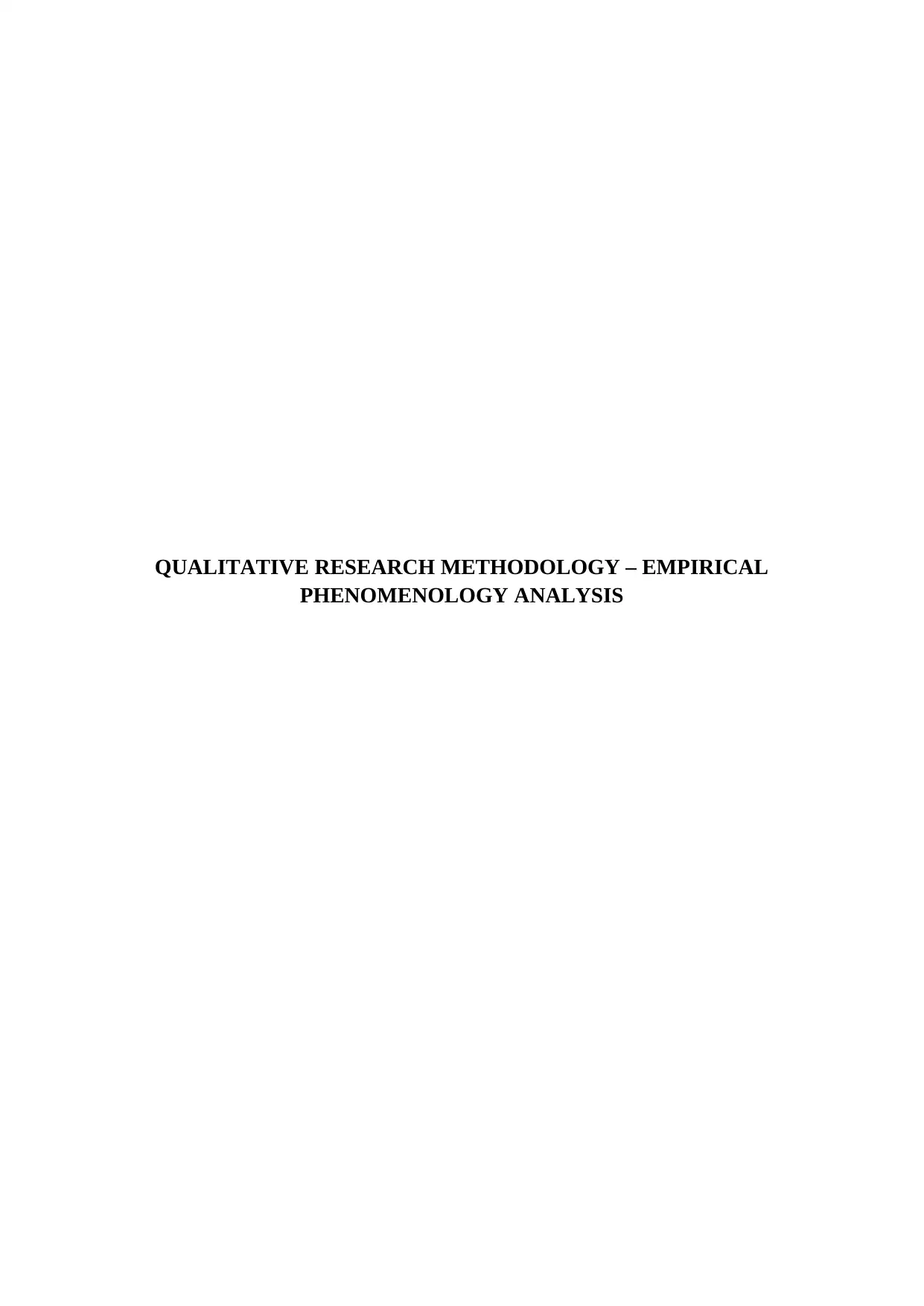
QUALITATIVE RESEARCH METHODOLOGY – EMPIRICAL
PHENOMENOLOGY ANALYSIS
PHENOMENOLOGY ANALYSIS
Paraphrase This Document
Need a fresh take? Get an instant paraphrase of this document with our AI Paraphraser
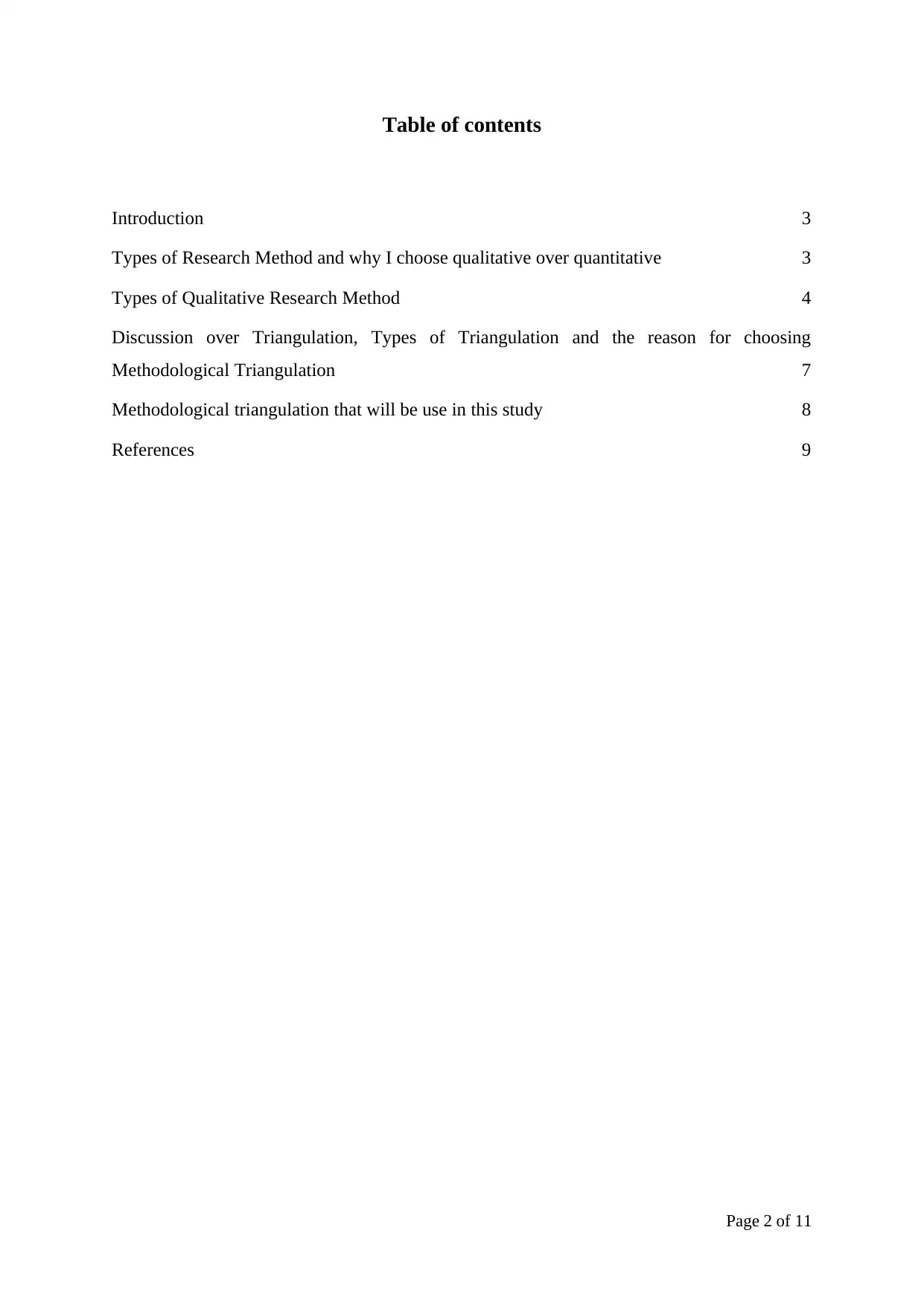
Table of contents
Introduction 3
Types of Research Method and why I choose qualitative over quantitative 3
Types of Qualitative Research Method 4
Discussion over Triangulation, Types of Triangulation and the reason for choosing
Methodological Triangulation 7
Methodological triangulation that will be use in this study 8
References 9
Page 2 of 11
Introduction 3
Types of Research Method and why I choose qualitative over quantitative 3
Types of Qualitative Research Method 4
Discussion over Triangulation, Types of Triangulation and the reason for choosing
Methodological Triangulation 7
Methodological triangulation that will be use in this study 8
References 9
Page 2 of 11
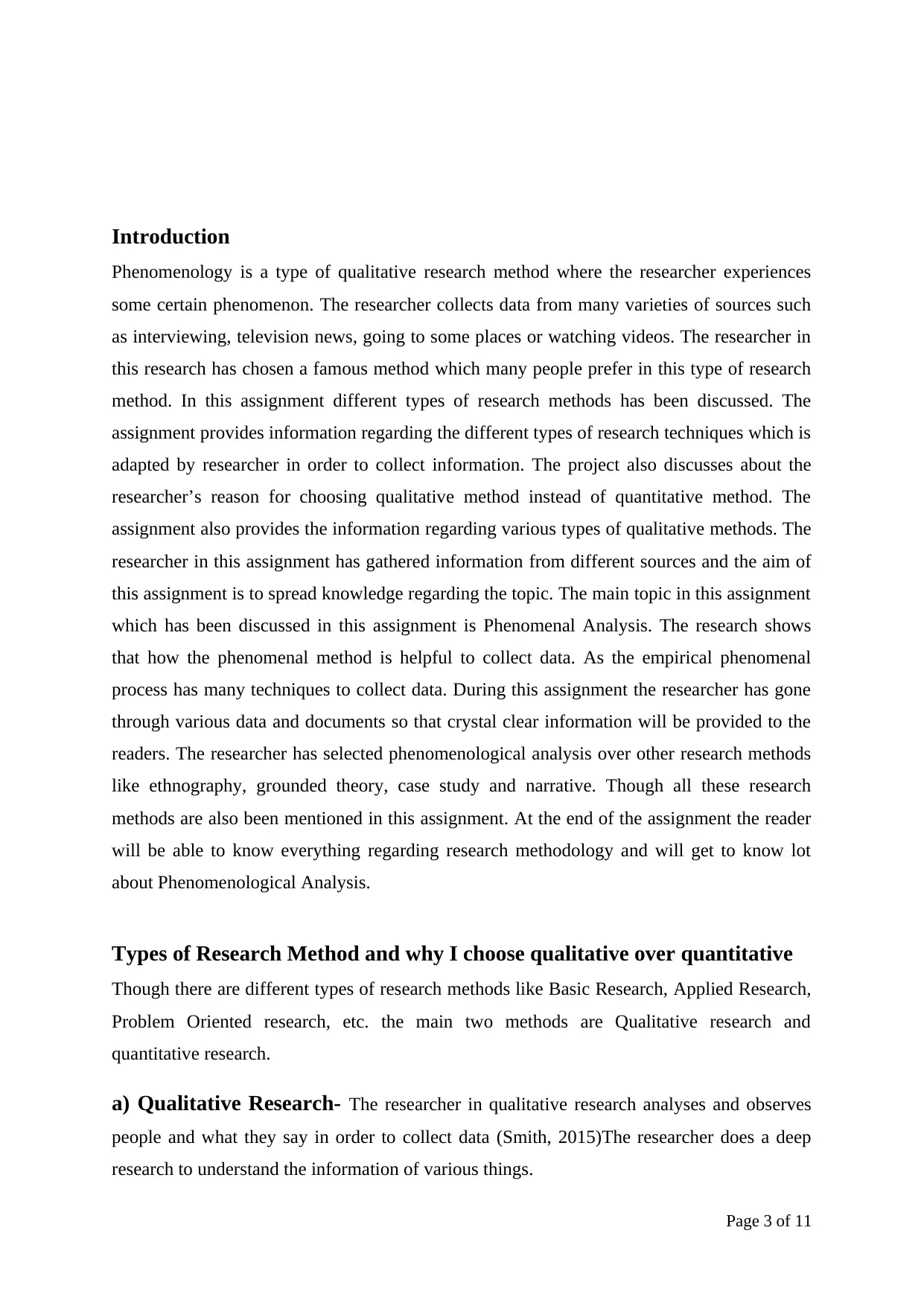
Introduction
Phenomenology is a type of qualitative research method where the researcher experiences
some certain phenomenon. The researcher collects data from many varieties of sources such
as interviewing, television news, going to some places or watching videos. The researcher in
this research has chosen a famous method which many people prefer in this type of research
method. In this assignment different types of research methods has been discussed. The
assignment provides information regarding the different types of research techniques which is
adapted by researcher in order to collect information. The project also discusses about the
researcher’s reason for choosing qualitative method instead of quantitative method. The
assignment also provides the information regarding various types of qualitative methods. The
researcher in this assignment has gathered information from different sources and the aim of
this assignment is to spread knowledge regarding the topic. The main topic in this assignment
which has been discussed in this assignment is Phenomenal Analysis. The research shows
that how the phenomenal method is helpful to collect data. As the empirical phenomenal
process has many techniques to collect data. During this assignment the researcher has gone
through various data and documents so that crystal clear information will be provided to the
readers. The researcher has selected phenomenological analysis over other research methods
like ethnography, grounded theory, case study and narrative. Though all these research
methods are also been mentioned in this assignment. At the end of the assignment the reader
will be able to know everything regarding research methodology and will get to know lot
about Phenomenological Analysis.
Types of Research Method and why I choose qualitative over quantitative
Though there are different types of research methods like Basic Research, Applied Research,
Problem Oriented research, etc. the main two methods are Qualitative research and
quantitative research.
a) Qualitative Research- The researcher in qualitative research analyses and observes
people and what they say in order to collect data (Smith, 2015)The researcher does a deep
research to understand the information of various things.
Page 3 of 11
Phenomenology is a type of qualitative research method where the researcher experiences
some certain phenomenon. The researcher collects data from many varieties of sources such
as interviewing, television news, going to some places or watching videos. The researcher in
this research has chosen a famous method which many people prefer in this type of research
method. In this assignment different types of research methods has been discussed. The
assignment provides information regarding the different types of research techniques which is
adapted by researcher in order to collect information. The project also discusses about the
researcher’s reason for choosing qualitative method instead of quantitative method. The
assignment also provides the information regarding various types of qualitative methods. The
researcher in this assignment has gathered information from different sources and the aim of
this assignment is to spread knowledge regarding the topic. The main topic in this assignment
which has been discussed in this assignment is Phenomenal Analysis. The research shows
that how the phenomenal method is helpful to collect data. As the empirical phenomenal
process has many techniques to collect data. During this assignment the researcher has gone
through various data and documents so that crystal clear information will be provided to the
readers. The researcher has selected phenomenological analysis over other research methods
like ethnography, grounded theory, case study and narrative. Though all these research
methods are also been mentioned in this assignment. At the end of the assignment the reader
will be able to know everything regarding research methodology and will get to know lot
about Phenomenological Analysis.
Types of Research Method and why I choose qualitative over quantitative
Though there are different types of research methods like Basic Research, Applied Research,
Problem Oriented research, etc. the main two methods are Qualitative research and
quantitative research.
a) Qualitative Research- The researcher in qualitative research analyses and observes
people and what they say in order to collect data (Smith, 2015)The researcher does a deep
research to understand the information of various things.
Page 3 of 11
⊘ This is a preview!⊘
Do you want full access?
Subscribe today to unlock all pages.

Trusted by 1+ million students worldwide
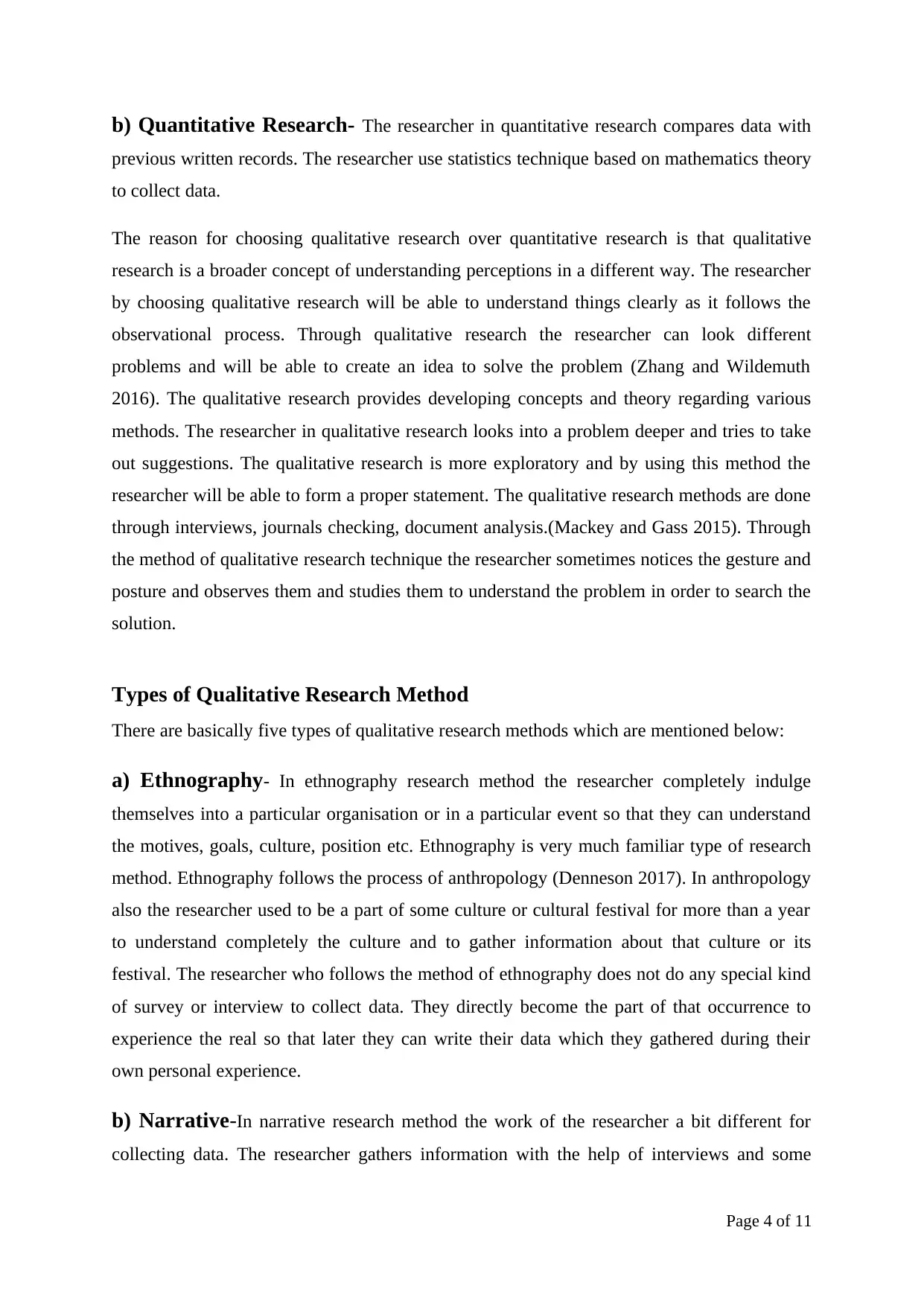
b) Quantitative Research- The researcher in quantitative research compares data with
previous written records. The researcher use statistics technique based on mathematics theory
to collect data.
The reason for choosing qualitative research over quantitative research is that qualitative
research is a broader concept of understanding perceptions in a different way. The researcher
by choosing qualitative research will be able to understand things clearly as it follows the
observational process. Through qualitative research the researcher can look different
problems and will be able to create an idea to solve the problem (Zhang and Wildemuth
2016). The qualitative research provides developing concepts and theory regarding various
methods. The researcher in qualitative research looks into a problem deeper and tries to take
out suggestions. The qualitative research is more exploratory and by using this method the
researcher will be able to form a proper statement. The qualitative research methods are done
through interviews, journals checking, document analysis.(Mackey and Gass 2015). Through
the method of qualitative research technique the researcher sometimes notices the gesture and
posture and observes them and studies them to understand the problem in order to search the
solution.
Types of Qualitative Research Method
There are basically five types of qualitative research methods which are mentioned below:
a) Ethnography- In ethnography research method the researcher completely indulge
themselves into a particular organisation or in a particular event so that they can understand
the motives, goals, culture, position etc. Ethnography is very much familiar type of research
method. Ethnography follows the process of anthropology (Denneson 2017). In anthropology
also the researcher used to be a part of some culture or cultural festival for more than a year
to understand completely the culture and to gather information about that culture or its
festival. The researcher who follows the method of ethnography does not do any special kind
of survey or interview to collect data. They directly become the part of that occurrence to
experience the real so that later they can write their data which they gathered during their
own personal experience.
b) Narrative-In narrative research method the work of the researcher a bit different for
collecting data. The researcher gathers information with the help of interviews and some
Page 4 of 11
previous written records. The researcher use statistics technique based on mathematics theory
to collect data.
The reason for choosing qualitative research over quantitative research is that qualitative
research is a broader concept of understanding perceptions in a different way. The researcher
by choosing qualitative research will be able to understand things clearly as it follows the
observational process. Through qualitative research the researcher can look different
problems and will be able to create an idea to solve the problem (Zhang and Wildemuth
2016). The qualitative research provides developing concepts and theory regarding various
methods. The researcher in qualitative research looks into a problem deeper and tries to take
out suggestions. The qualitative research is more exploratory and by using this method the
researcher will be able to form a proper statement. The qualitative research methods are done
through interviews, journals checking, document analysis.(Mackey and Gass 2015). Through
the method of qualitative research technique the researcher sometimes notices the gesture and
posture and observes them and studies them to understand the problem in order to search the
solution.
Types of Qualitative Research Method
There are basically five types of qualitative research methods which are mentioned below:
a) Ethnography- In ethnography research method the researcher completely indulge
themselves into a particular organisation or in a particular event so that they can understand
the motives, goals, culture, position etc. Ethnography is very much familiar type of research
method. Ethnography follows the process of anthropology (Denneson 2017). In anthropology
also the researcher used to be a part of some culture or cultural festival for more than a year
to understand completely the culture and to gather information about that culture or its
festival. The researcher who follows the method of ethnography does not do any special kind
of survey or interview to collect data. They directly become the part of that occurrence to
experience the real so that later they can write their data which they gathered during their
own personal experience.
b) Narrative-In narrative research method the work of the researcher a bit different for
collecting data. The researcher gathers information with the help of interviews and some
Page 4 of 11
Paraphrase This Document
Need a fresh take? Get an instant paraphrase of this document with our AI Paraphraser
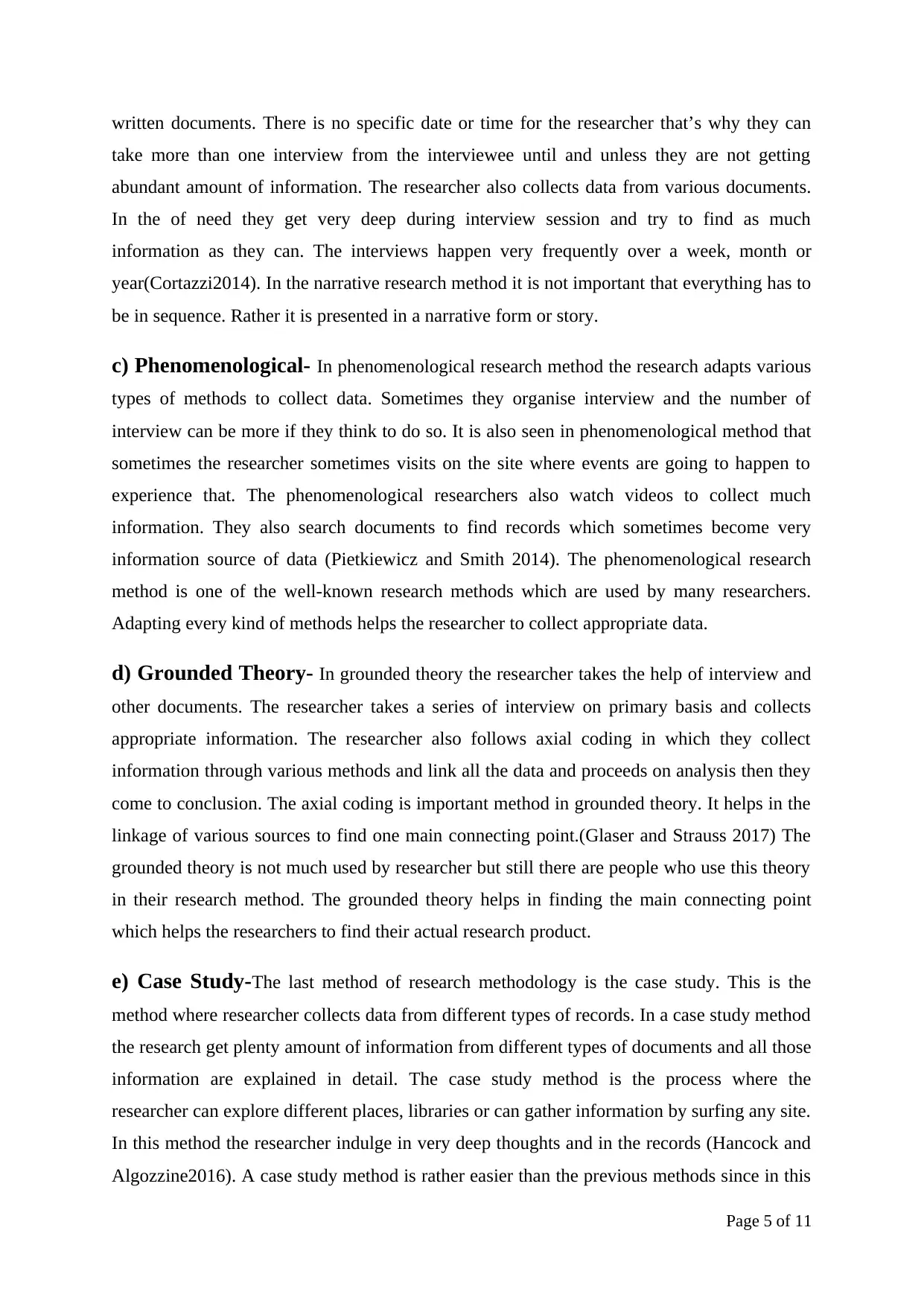
written documents. There is no specific date or time for the researcher that’s why they can
take more than one interview from the interviewee until and unless they are not getting
abundant amount of information. The researcher also collects data from various documents.
In the of need they get very deep during interview session and try to find as much
information as they can. The interviews happen very frequently over a week, month or
year(Cortazzi2014). In the narrative research method it is not important that everything has to
be in sequence. Rather it is presented in a narrative form or story.
c) Phenomenological- In phenomenological research method the research adapts various
types of methods to collect data. Sometimes they organise interview and the number of
interview can be more if they think to do so. It is also seen in phenomenological method that
sometimes the researcher sometimes visits on the site where events are going to happen to
experience that. The phenomenological researchers also watch videos to collect much
information. They also search documents to find records which sometimes become very
information source of data (Pietkiewicz and Smith 2014). The phenomenological research
method is one of the well-known research methods which are used by many researchers.
Adapting every kind of methods helps the researcher to collect appropriate data.
d) Grounded Theory- In grounded theory the researcher takes the help of interview and
other documents. The researcher takes a series of interview on primary basis and collects
appropriate information. The researcher also follows axial coding in which they collect
information through various methods and link all the data and proceeds on analysis then they
come to conclusion. The axial coding is important method in grounded theory. It helps in the
linkage of various sources to find one main connecting point.(Glaser and Strauss 2017) The
grounded theory is not much used by researcher but still there are people who use this theory
in their research method. The grounded theory helps in finding the main connecting point
which helps the researchers to find their actual research product.
e) Case Study-The last method of research methodology is the case study. This is the
method where researcher collects data from different types of records. In a case study method
the research get plenty amount of information from different types of documents and all those
information are explained in detail. The case study method is the process where the
researcher can explore different places, libraries or can gather information by surfing any site.
In this method the researcher indulge in very deep thoughts and in the records (Hancock and
Algozzine2016). A case study method is rather easier than the previous methods since in this
Page 5 of 11
take more than one interview from the interviewee until and unless they are not getting
abundant amount of information. The researcher also collects data from various documents.
In the of need they get very deep during interview session and try to find as much
information as they can. The interviews happen very frequently over a week, month or
year(Cortazzi2014). In the narrative research method it is not important that everything has to
be in sequence. Rather it is presented in a narrative form or story.
c) Phenomenological- In phenomenological research method the research adapts various
types of methods to collect data. Sometimes they organise interview and the number of
interview can be more if they think to do so. It is also seen in phenomenological method that
sometimes the researcher sometimes visits on the site where events are going to happen to
experience that. The phenomenological researchers also watch videos to collect much
information. They also search documents to find records which sometimes become very
information source of data (Pietkiewicz and Smith 2014). The phenomenological research
method is one of the well-known research methods which are used by many researchers.
Adapting every kind of methods helps the researcher to collect appropriate data.
d) Grounded Theory- In grounded theory the researcher takes the help of interview and
other documents. The researcher takes a series of interview on primary basis and collects
appropriate information. The researcher also follows axial coding in which they collect
information through various methods and link all the data and proceeds on analysis then they
come to conclusion. The axial coding is important method in grounded theory. It helps in the
linkage of various sources to find one main connecting point.(Glaser and Strauss 2017) The
grounded theory is not much used by researcher but still there are people who use this theory
in their research method. The grounded theory helps in finding the main connecting point
which helps the researchers to find their actual research product.
e) Case Study-The last method of research methodology is the case study. This is the
method where researcher collects data from different types of records. In a case study method
the research get plenty amount of information from different types of documents and all those
information are explained in detail. The case study method is the process where the
researcher can explore different places, libraries or can gather information by surfing any site.
In this method the researcher indulge in very deep thoughts and in the records (Hancock and
Algozzine2016). A case study method is rather easier than the previous methods since in this
Page 5 of 11
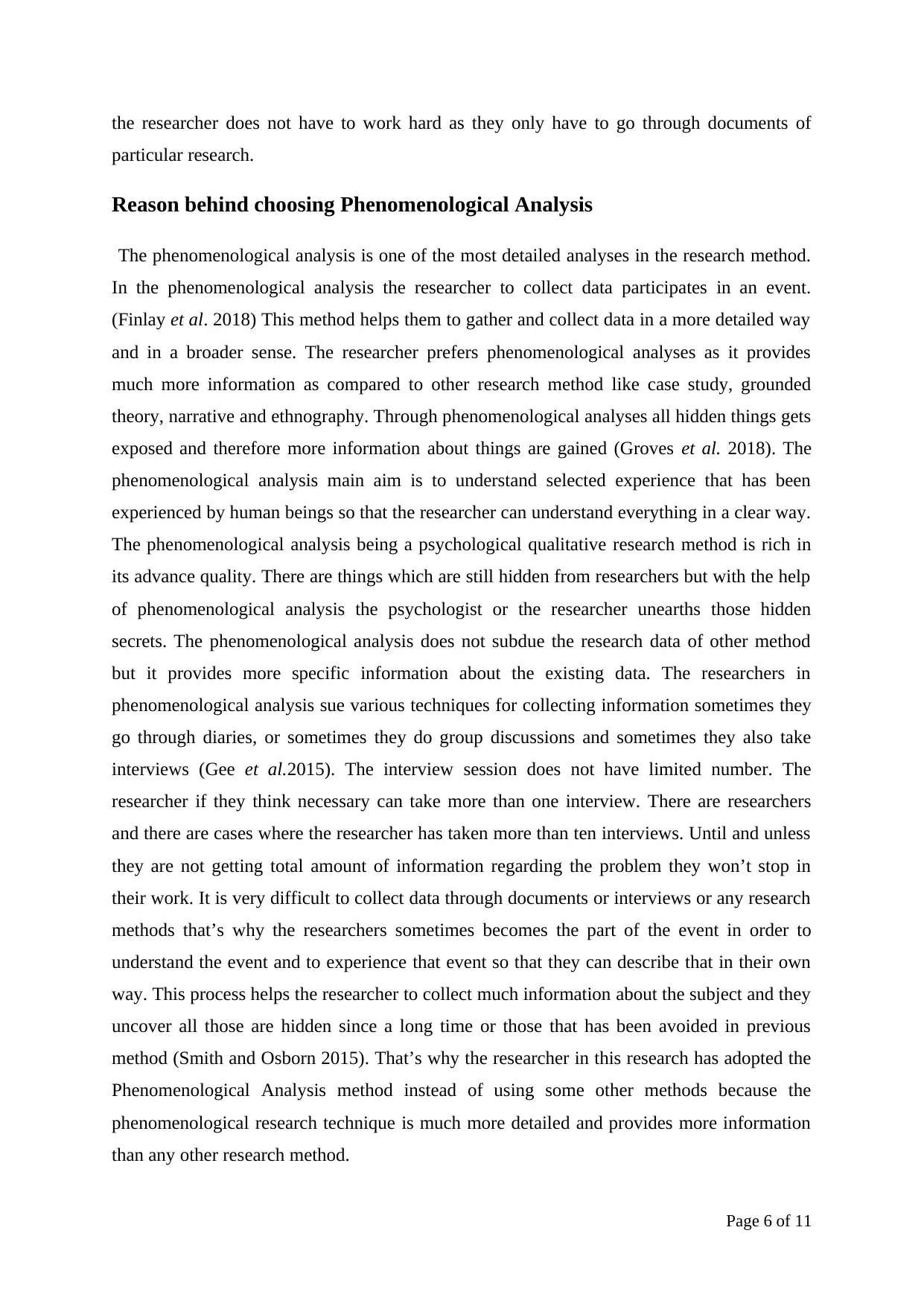
the researcher does not have to work hard as they only have to go through documents of
particular research.
Reason behind choosing Phenomenological Analysis
The phenomenological analysis is one of the most detailed analyses in the research method.
In the phenomenological analysis the researcher to collect data participates in an event.
(Finlay et al. 2018) This method helps them to gather and collect data in a more detailed way
and in a broader sense. The researcher prefers phenomenological analyses as it provides
much more information as compared to other research method like case study, grounded
theory, narrative and ethnography. Through phenomenological analyses all hidden things gets
exposed and therefore more information about things are gained (Groves et al. 2018). The
phenomenological analysis main aim is to understand selected experience that has been
experienced by human beings so that the researcher can understand everything in a clear way.
The phenomenological analysis being a psychological qualitative research method is rich in
its advance quality. There are things which are still hidden from researchers but with the help
of phenomenological analysis the psychologist or the researcher unearths those hidden
secrets. The phenomenological analysis does not subdue the research data of other method
but it provides more specific information about the existing data. The researchers in
phenomenological analysis sue various techniques for collecting information sometimes they
go through diaries, or sometimes they do group discussions and sometimes they also take
interviews (Gee et al.2015). The interview session does not have limited number. The
researcher if they think necessary can take more than one interview. There are researchers
and there are cases where the researcher has taken more than ten interviews. Until and unless
they are not getting total amount of information regarding the problem they won’t stop in
their work. It is very difficult to collect data through documents or interviews or any research
methods that’s why the researchers sometimes becomes the part of the event in order to
understand the event and to experience that event so that they can describe that in their own
way. This process helps the researcher to collect much information about the subject and they
uncover all those are hidden since a long time or those that has been avoided in previous
method (Smith and Osborn 2015). That’s why the researcher in this research has adopted the
Phenomenological Analysis method instead of using some other methods because the
phenomenological research technique is much more detailed and provides more information
than any other research method.
Page 6 of 11
particular research.
Reason behind choosing Phenomenological Analysis
The phenomenological analysis is one of the most detailed analyses in the research method.
In the phenomenological analysis the researcher to collect data participates in an event.
(Finlay et al. 2018) This method helps them to gather and collect data in a more detailed way
and in a broader sense. The researcher prefers phenomenological analyses as it provides
much more information as compared to other research method like case study, grounded
theory, narrative and ethnography. Through phenomenological analyses all hidden things gets
exposed and therefore more information about things are gained (Groves et al. 2018). The
phenomenological analysis main aim is to understand selected experience that has been
experienced by human beings so that the researcher can understand everything in a clear way.
The phenomenological analysis being a psychological qualitative research method is rich in
its advance quality. There are things which are still hidden from researchers but with the help
of phenomenological analysis the psychologist or the researcher unearths those hidden
secrets. The phenomenological analysis does not subdue the research data of other method
but it provides more specific information about the existing data. The researchers in
phenomenological analysis sue various techniques for collecting information sometimes they
go through diaries, or sometimes they do group discussions and sometimes they also take
interviews (Gee et al.2015). The interview session does not have limited number. The
researcher if they think necessary can take more than one interview. There are researchers
and there are cases where the researcher has taken more than ten interviews. Until and unless
they are not getting total amount of information regarding the problem they won’t stop in
their work. It is very difficult to collect data through documents or interviews or any research
methods that’s why the researchers sometimes becomes the part of the event in order to
understand the event and to experience that event so that they can describe that in their own
way. This process helps the researcher to collect much information about the subject and they
uncover all those are hidden since a long time or those that has been avoided in previous
method (Smith and Osborn 2015). That’s why the researcher in this research has adopted the
Phenomenological Analysis method instead of using some other methods because the
phenomenological research technique is much more detailed and provides more information
than any other research method.
Page 6 of 11
⊘ This is a preview!⊘
Do you want full access?
Subscribe today to unlock all pages.

Trusted by 1+ million students worldwide
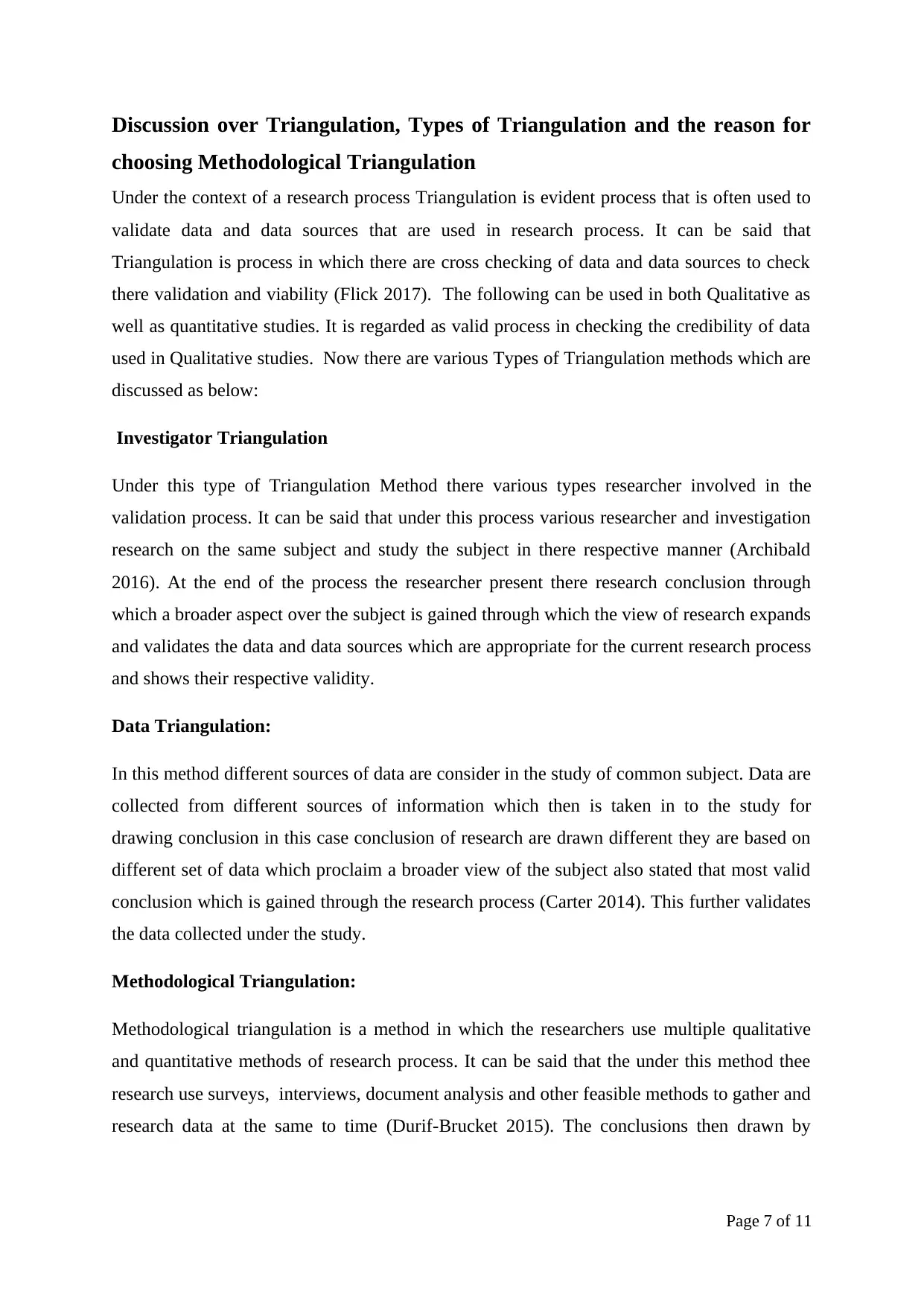
Discussion over Triangulation, Types of Triangulation and the reason for
choosing Methodological Triangulation
Under the context of a research process Triangulation is evident process that is often used to
validate data and data sources that are used in research process. It can be said that
Triangulation is process in which there are cross checking of data and data sources to check
there validation and viability (Flick 2017). The following can be used in both Qualitative as
well as quantitative studies. It is regarded as valid process in checking the credibility of data
used in Qualitative studies. Now there are various Types of Triangulation methods which are
discussed as below:
Investigator Triangulation
Under this type of Triangulation Method there various types researcher involved in the
validation process. It can be said that under this process various researcher and investigation
research on the same subject and study the subject in there respective manner (Archibald
2016). At the end of the process the researcher present there research conclusion through
which a broader aspect over the subject is gained through which the view of research expands
and validates the data and data sources which are appropriate for the current research process
and shows their respective validity.
Data Triangulation:
In this method different sources of data are consider in the study of common subject. Data are
collected from different sources of information which then is taken in to the study for
drawing conclusion in this case conclusion of research are drawn different they are based on
different set of data which proclaim a broader view of the subject also stated that most valid
conclusion which is gained through the research process (Carter 2014). This further validates
the data collected under the study.
Methodological Triangulation:
Methodological triangulation is a method in which the researchers use multiple qualitative
and quantitative methods of research process. It can be said that the under this method thee
research use surveys, interviews, document analysis and other feasible methods to gather and
research data at the same to time (Durif-Brucket 2015). The conclusions then drawn by
Page 7 of 11
choosing Methodological Triangulation
Under the context of a research process Triangulation is evident process that is often used to
validate data and data sources that are used in research process. It can be said that
Triangulation is process in which there are cross checking of data and data sources to check
there validation and viability (Flick 2017). The following can be used in both Qualitative as
well as quantitative studies. It is regarded as valid process in checking the credibility of data
used in Qualitative studies. Now there are various Types of Triangulation methods which are
discussed as below:
Investigator Triangulation
Under this type of Triangulation Method there various types researcher involved in the
validation process. It can be said that under this process various researcher and investigation
research on the same subject and study the subject in there respective manner (Archibald
2016). At the end of the process the researcher present there research conclusion through
which a broader aspect over the subject is gained through which the view of research expands
and validates the data and data sources which are appropriate for the current research process
and shows their respective validity.
Data Triangulation:
In this method different sources of data are consider in the study of common subject. Data are
collected from different sources of information which then is taken in to the study for
drawing conclusion in this case conclusion of research are drawn different they are based on
different set of data which proclaim a broader view of the subject also stated that most valid
conclusion which is gained through the research process (Carter 2014). This further validates
the data collected under the study.
Methodological Triangulation:
Methodological triangulation is a method in which the researchers use multiple qualitative
and quantitative methods of research process. It can be said that the under this method thee
research use surveys, interviews, document analysis and other feasible methods to gather and
research data at the same to time (Durif-Brucket 2015). The conclusions then drawn by
Page 7 of 11
Paraphrase This Document
Need a fresh take? Get an instant paraphrase of this document with our AI Paraphraser
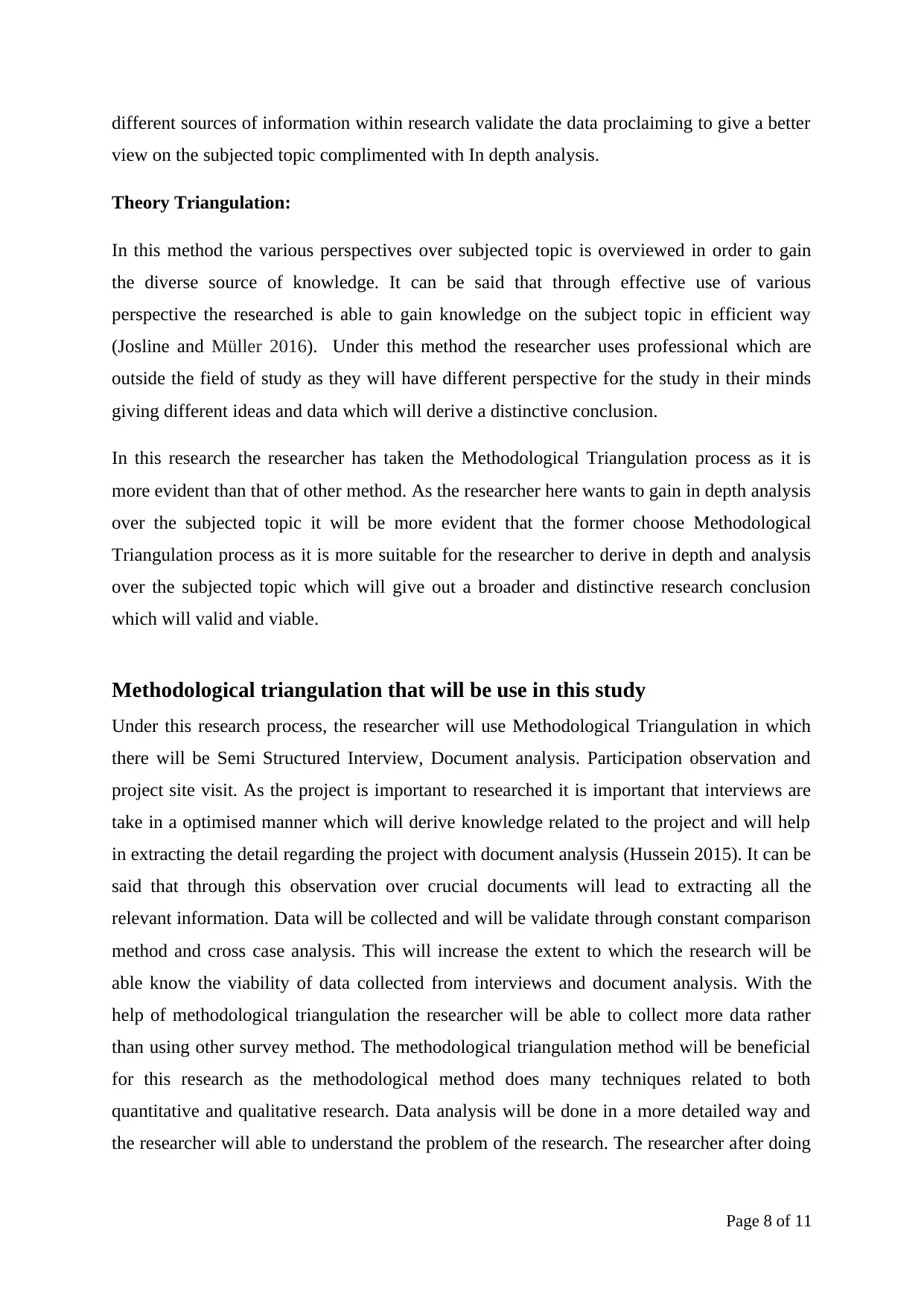
different sources of information within research validate the data proclaiming to give a better
view on the subjected topic complimented with In depth analysis.
Theory Triangulation:
In this method the various perspectives over subjected topic is overviewed in order to gain
the diverse source of knowledge. It can be said that through effective use of various
perspective the researched is able to gain knowledge on the subject topic in efficient way
(Josline and Müller 2016). Under this method the researcher uses professional which are
outside the field of study as they will have different perspective for the study in their minds
giving different ideas and data which will derive a distinctive conclusion.
In this research the researcher has taken the Methodological Triangulation process as it is
more evident than that of other method. As the researcher here wants to gain in depth analysis
over the subjected topic it will be more evident that the former choose Methodological
Triangulation process as it is more suitable for the researcher to derive in depth and analysis
over the subjected topic which will give out a broader and distinctive research conclusion
which will valid and viable.
Methodological triangulation that will be use in this study
Under this research process, the researcher will use Methodological Triangulation in which
there will be Semi Structured Interview, Document analysis. Participation observation and
project site visit. As the project is important to researched it is important that interviews are
take in a optimised manner which will derive knowledge related to the project and will help
in extracting the detail regarding the project with document analysis (Hussein 2015). It can be
said that through this observation over crucial documents will lead to extracting all the
relevant information. Data will be collected and will be validate through constant comparison
method and cross case analysis. This will increase the extent to which the research will be
able know the viability of data collected from interviews and document analysis. With the
help of methodological triangulation the researcher will be able to collect more data rather
than using other survey method. The methodological triangulation method will be beneficial
for this research as the methodological method does many techniques related to both
quantitative and qualitative research. Data analysis will be done in a more detailed way and
the researcher will able to understand the problem of the research. The researcher after doing
Page 8 of 11
view on the subjected topic complimented with In depth analysis.
Theory Triangulation:
In this method the various perspectives over subjected topic is overviewed in order to gain
the diverse source of knowledge. It can be said that through effective use of various
perspective the researched is able to gain knowledge on the subject topic in efficient way
(Josline and Müller 2016). Under this method the researcher uses professional which are
outside the field of study as they will have different perspective for the study in their minds
giving different ideas and data which will derive a distinctive conclusion.
In this research the researcher has taken the Methodological Triangulation process as it is
more evident than that of other method. As the researcher here wants to gain in depth analysis
over the subjected topic it will be more evident that the former choose Methodological
Triangulation process as it is more suitable for the researcher to derive in depth and analysis
over the subjected topic which will give out a broader and distinctive research conclusion
which will valid and viable.
Methodological triangulation that will be use in this study
Under this research process, the researcher will use Methodological Triangulation in which
there will be Semi Structured Interview, Document analysis. Participation observation and
project site visit. As the project is important to researched it is important that interviews are
take in a optimised manner which will derive knowledge related to the project and will help
in extracting the detail regarding the project with document analysis (Hussein 2015). It can be
said that through this observation over crucial documents will lead to extracting all the
relevant information. Data will be collected and will be validate through constant comparison
method and cross case analysis. This will increase the extent to which the research will be
able know the viability of data collected from interviews and document analysis. With the
help of methodological triangulation the researcher will be able to collect more data rather
than using other survey method. The methodological triangulation method will be beneficial
for this research as the methodological method does many techniques related to both
quantitative and qualitative research. Data analysis will be done in a more detailed way and
the researcher will able to understand the problem of the research. The researcher after doing
Page 8 of 11
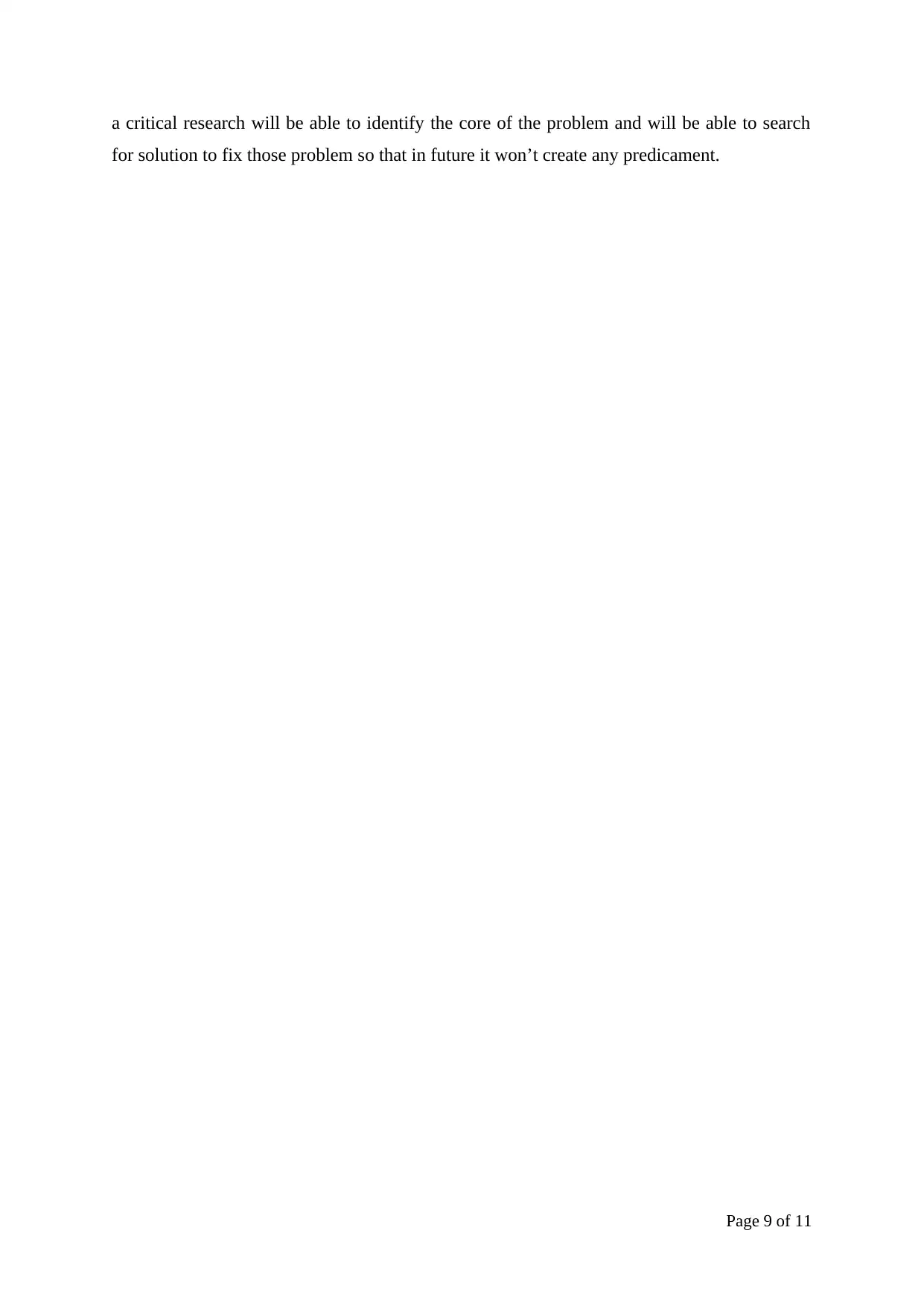
a critical research will be able to identify the core of the problem and will be able to search
for solution to fix those problem so that in future it won’t create any predicament.
Page 9 of 11
for solution to fix those problem so that in future it won’t create any predicament.
Page 9 of 11
⊘ This is a preview!⊘
Do you want full access?
Subscribe today to unlock all pages.

Trusted by 1+ million students worldwide
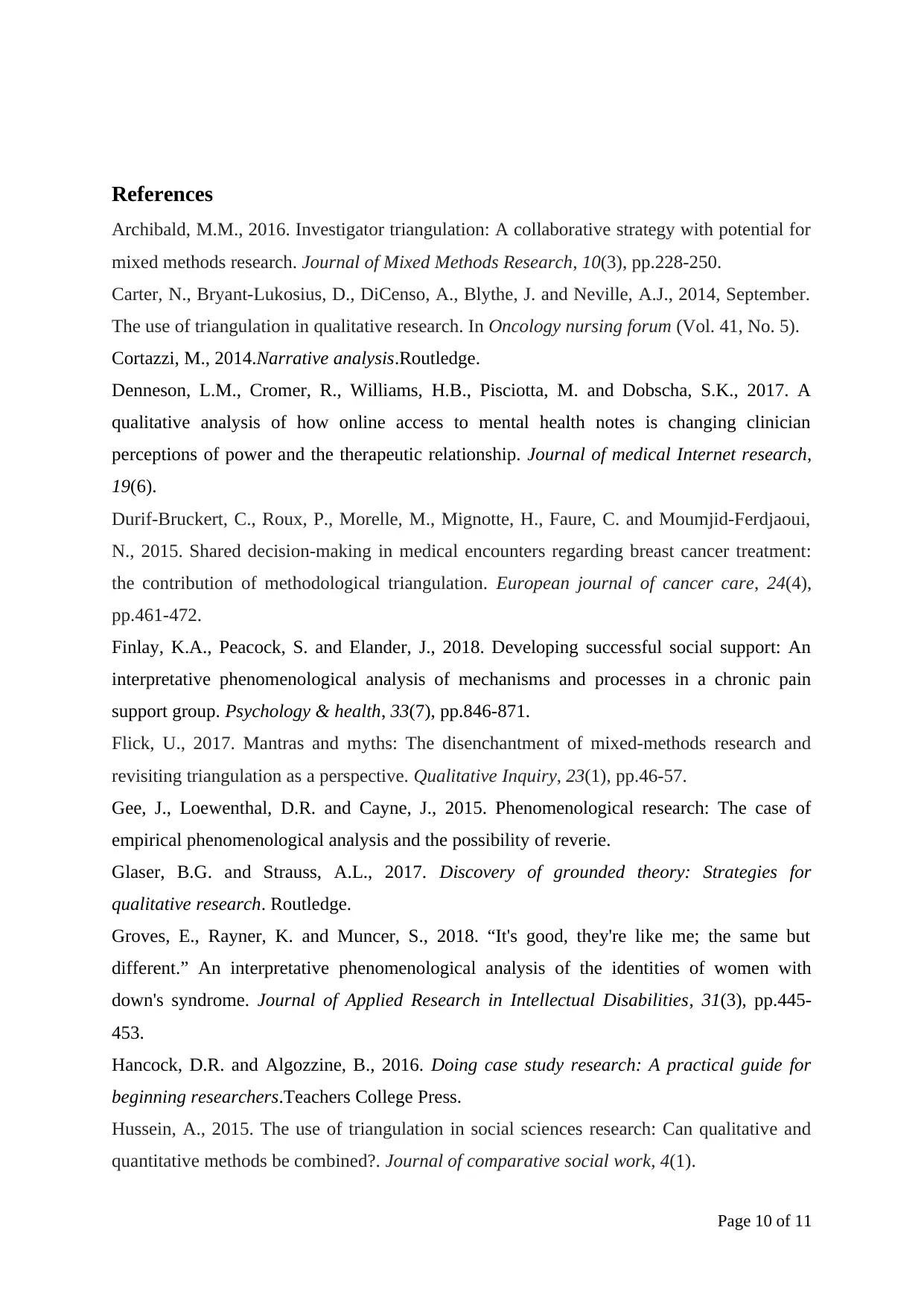
References
Archibald, M.M., 2016. Investigator triangulation: A collaborative strategy with potential for
mixed methods research. Journal of Mixed Methods Research, 10(3), pp.228-250.
Carter, N., Bryant-Lukosius, D., DiCenso, A., Blythe, J. and Neville, A.J., 2014, September.
The use of triangulation in qualitative research. In Oncology nursing forum (Vol. 41, No. 5).
Cortazzi, M., 2014.Narrative analysis.Routledge.
Denneson, L.M., Cromer, R., Williams, H.B., Pisciotta, M. and Dobscha, S.K., 2017. A
qualitative analysis of how online access to mental health notes is changing clinician
perceptions of power and the therapeutic relationship. Journal of medical Internet research,
19(6).
Durif‐Bruckert, C., Roux, P., Morelle, M., Mignotte, H., Faure, C. and Moumjid‐Ferdjaoui,
N., 2015. Shared decision‐making in medical encounters regarding breast cancer treatment:
the contribution of methodological triangulation. European journal of cancer care, 24(4),
pp.461-472.
Finlay, K.A., Peacock, S. and Elander, J., 2018. Developing successful social support: An
interpretative phenomenological analysis of mechanisms and processes in a chronic pain
support group. Psychology & health, 33(7), pp.846-871.
Flick, U., 2017. Mantras and myths: The disenchantment of mixed-methods research and
revisiting triangulation as a perspective. Qualitative Inquiry, 23(1), pp.46-57.
Gee, J., Loewenthal, D.R. and Cayne, J., 2015. Phenomenological research: The case of
empirical phenomenological analysis and the possibility of reverie.
Glaser, B.G. and Strauss, A.L., 2017. Discovery of grounded theory: Strategies for
qualitative research. Routledge.
Groves, E., Rayner, K. and Muncer, S., 2018. “It's good, they're like me; the same but
different.” An interpretative phenomenological analysis of the identities of women with
down's syndrome. Journal of Applied Research in Intellectual Disabilities, 31(3), pp.445-
453.
Hancock, D.R. and Algozzine, B., 2016. Doing case study research: A practical guide for
beginning researchers.Teachers College Press.
Hussein, A., 2015. The use of triangulation in social sciences research: Can qualitative and
quantitative methods be combined?. Journal of comparative social work, 4(1).
Page 10 of 11
Archibald, M.M., 2016. Investigator triangulation: A collaborative strategy with potential for
mixed methods research. Journal of Mixed Methods Research, 10(3), pp.228-250.
Carter, N., Bryant-Lukosius, D., DiCenso, A., Blythe, J. and Neville, A.J., 2014, September.
The use of triangulation in qualitative research. In Oncology nursing forum (Vol. 41, No. 5).
Cortazzi, M., 2014.Narrative analysis.Routledge.
Denneson, L.M., Cromer, R., Williams, H.B., Pisciotta, M. and Dobscha, S.K., 2017. A
qualitative analysis of how online access to mental health notes is changing clinician
perceptions of power and the therapeutic relationship. Journal of medical Internet research,
19(6).
Durif‐Bruckert, C., Roux, P., Morelle, M., Mignotte, H., Faure, C. and Moumjid‐Ferdjaoui,
N., 2015. Shared decision‐making in medical encounters regarding breast cancer treatment:
the contribution of methodological triangulation. European journal of cancer care, 24(4),
pp.461-472.
Finlay, K.A., Peacock, S. and Elander, J., 2018. Developing successful social support: An
interpretative phenomenological analysis of mechanisms and processes in a chronic pain
support group. Psychology & health, 33(7), pp.846-871.
Flick, U., 2017. Mantras and myths: The disenchantment of mixed-methods research and
revisiting triangulation as a perspective. Qualitative Inquiry, 23(1), pp.46-57.
Gee, J., Loewenthal, D.R. and Cayne, J., 2015. Phenomenological research: The case of
empirical phenomenological analysis and the possibility of reverie.
Glaser, B.G. and Strauss, A.L., 2017. Discovery of grounded theory: Strategies for
qualitative research. Routledge.
Groves, E., Rayner, K. and Muncer, S., 2018. “It's good, they're like me; the same but
different.” An interpretative phenomenological analysis of the identities of women with
down's syndrome. Journal of Applied Research in Intellectual Disabilities, 31(3), pp.445-
453.
Hancock, D.R. and Algozzine, B., 2016. Doing case study research: A practical guide for
beginning researchers.Teachers College Press.
Hussein, A., 2015. The use of triangulation in social sciences research: Can qualitative and
quantitative methods be combined?. Journal of comparative social work, 4(1).
Page 10 of 11
Paraphrase This Document
Need a fresh take? Get an instant paraphrase of this document with our AI Paraphraser
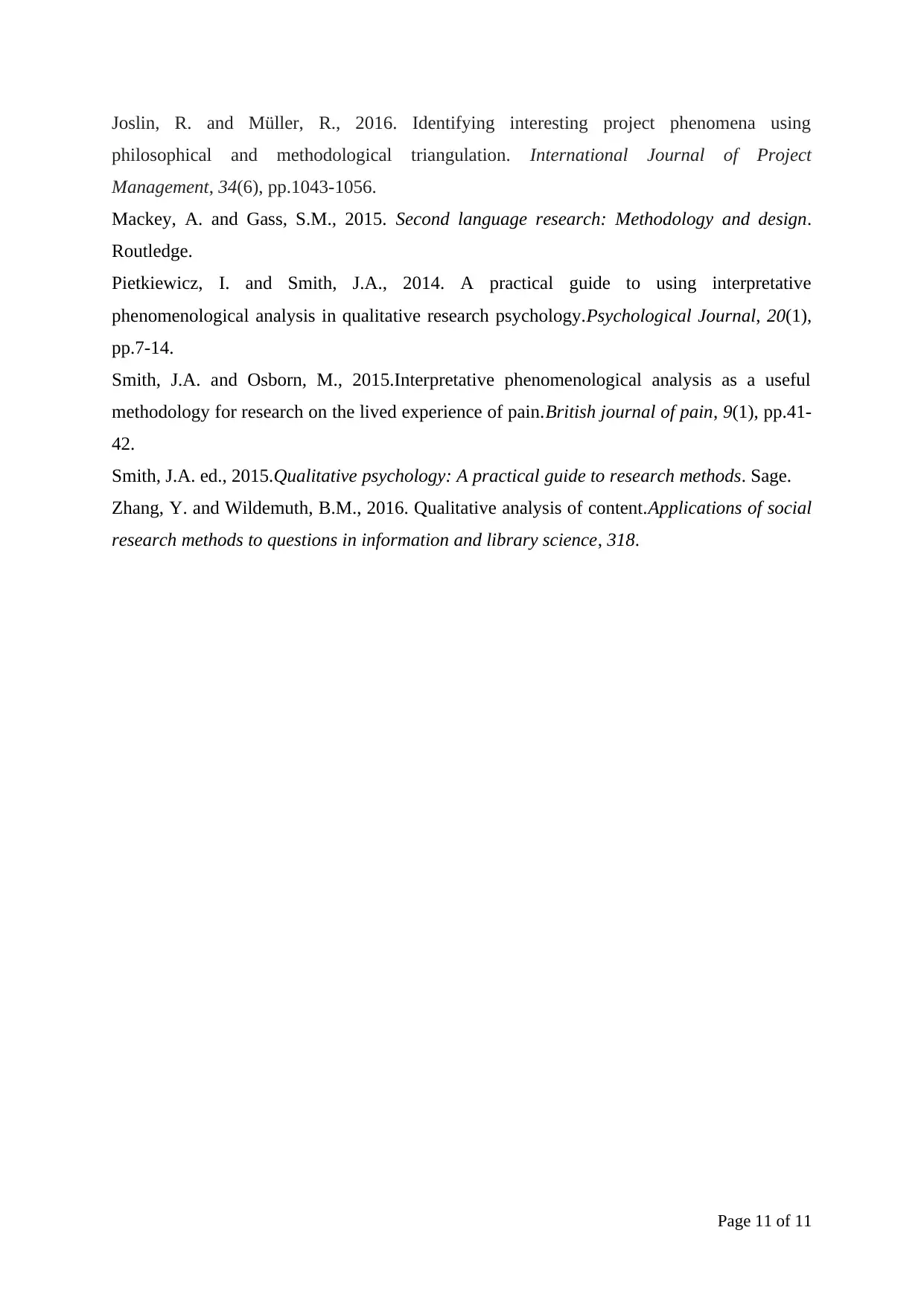
Joslin, R. and Müller, R., 2016. Identifying interesting project phenomena using
philosophical and methodological triangulation. International Journal of Project
Management, 34(6), pp.1043-1056.
Mackey, A. and Gass, S.M., 2015. Second language research: Methodology and design.
Routledge.
Pietkiewicz, I. and Smith, J.A., 2014. A practical guide to using interpretative
phenomenological analysis in qualitative research psychology.Psychological Journal, 20(1),
pp.7-14.
Smith, J.A. and Osborn, M., 2015.Interpretative phenomenological analysis as a useful
methodology for research on the lived experience of pain.British journal of pain, 9(1), pp.41-
42.
Smith, J.A. ed., 2015.Qualitative psychology: A practical guide to research methods. Sage.
Zhang, Y. and Wildemuth, B.M., 2016. Qualitative analysis of content.Applications of social
research methods to questions in information and library science, 318.
Page 11 of 11
philosophical and methodological triangulation. International Journal of Project
Management, 34(6), pp.1043-1056.
Mackey, A. and Gass, S.M., 2015. Second language research: Methodology and design.
Routledge.
Pietkiewicz, I. and Smith, J.A., 2014. A practical guide to using interpretative
phenomenological analysis in qualitative research psychology.Psychological Journal, 20(1),
pp.7-14.
Smith, J.A. and Osborn, M., 2015.Interpretative phenomenological analysis as a useful
methodology for research on the lived experience of pain.British journal of pain, 9(1), pp.41-
42.
Smith, J.A. ed., 2015.Qualitative psychology: A practical guide to research methods. Sage.
Zhang, Y. and Wildemuth, B.M., 2016. Qualitative analysis of content.Applications of social
research methods to questions in information and library science, 318.
Page 11 of 11
1 out of 11
Related Documents
Your All-in-One AI-Powered Toolkit for Academic Success.
+13062052269
info@desklib.com
Available 24*7 on WhatsApp / Email
![[object Object]](/_next/static/media/star-bottom.7253800d.svg)
Unlock your academic potential
Copyright © 2020–2025 A2Z Services. All Rights Reserved. Developed and managed by ZUCOL.





